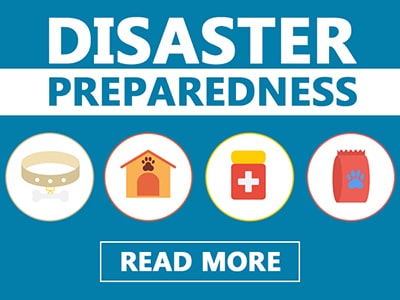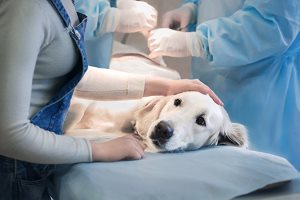Pet Evacuation Kit
Written By: Melissa G.

With the recent 7.1 and 6.4 magnitude earthquakes that have shaken Southern California, our pet owners have been asking us for information about how to safely evacuate their pets should another earthquake or natural disaster occur. Our staff at Bloomfield Animal Hospital in the
Lakewood, CA area have the following tips to keep the furry members of your family safe in a crisis.
The importance of having an evacuation plan
Living in California we do have our fair share of natural disasters, such as fires, floods, landslides, and earthquakes, and you can never predict when they will occur, as the recent earthquakes have demonstrated. It has been predicted by the U.S. Geological Survey that there is a 50 percent chance that another earthquake of magnitude 5 or higher could occur within a week of the July 2019 earthquakes, as well as a 5 percent chance that an even larger earthquake will happen within a year. Aftershocks from earthquakes can be just as damaging as the precipitating events--in fact, in the recent Southern California earthquakes, the 7.1 magnitude quake was determined to be an aftershock of the 6.4 earthquake.
Because of this, we should all be prepared at a moment’s notice to find a safe place for shelter during an active disaster, or to leave our homes should evacuation be necessary. These types of emergencies can be very stressful for us, but can you imagine how stressed your pets will be to be suddenly taken from their homes? Our pets are part of our family and we must look out for them as well.
Staying safe during an earthquake
One of the most important things you can do during an active crisis such as an earthquake is to keep your pet with you. Pets tend to run away when they are scared and can become difficult to find should you need to leave your home. Even worse, they may become trapped by falling debris. Being familiar with where your pet tends to hide in these cases can be helpful, but the best prevention is to keep your pet on a leash or within arm’s reach while you safely take shelter.
If you need to leave your house

If you have to leave your house for a natural disaster,
please take your pet with you. In these types of situations, we do not know when, or even if, we can go back home. An important thing to remember is that if you had to evacuate, your local veterinary office likely had to evacuate as well. You also cannot rely on your phone or the internet because there may be no service or power to keep your phone charged, so it is imperative that you have physical copies of everything you may need in such an emergency.
What to bring for your pet
The following items are what we suggest you have ready for your pet:
- Crate/carrier: In evacuation centers, they may require you to confine your pet. It is important that you have a properly sized crate/carrier. Your pet should be able to stand up and make one complete rotation inside comfortably. You can also use your pet’s carrier/crate to store all their necessities. This will be useful in the event you have to leave suddenly.
- Bedding/towels/toys: Have plenty of comfortable bedding or towels available for your pet, or something else from home that will comfort your pet. You should also bring toys so that when you are able to take your pet out of the crate/carrier, you can use them to burn up stored energy that your pet may have.
- Copy of your pet’s medical records: It is very important you have a physical copy of your pet’s medical records, especially their vaccination record. Place the copy in a plastic resealable bag. The evacuation center will determine their own rules, but in the past, evacuation centers have not accepted pets if they were not current with their vaccines.
- Dogs: DHPP, Bordetella, and Rabies
- Cats: FVRCP and Rabies
- Leash/collar: This is important to have so you can transport your pet safely.
- Pet food, water, and bowls: You should have at least one weeks’ worth of food for your pet.
- Cat litter and disposable trays: Keep these aside with your emergency supplies for easy use wherever you may end up with your cat.

- Microchip information: Having your pet microchipped is a great way to be reunited with your pet if he/she is ever lost. Have a copy of the microchip number and the phone number of the company the microchip is registered with. You can place this information in the plastic resealable bag along with their medical records.
- Picture of yourself with your pet: Having a physical picture of you and your pet is a great way to establish ownership of your pet in the event that he/she gets lost. It will also serve as a great way to make flyers in case you need to.
- Pet medication: If your pet is on daily medication, have at least one month’s worth of medication available. Just be sure that the medication is in the original packaging and/or vial from your veterinary office.
- Pet first aid kit: These are relatively easy to make, but ask your veterinarian for advice on what to include.
- Flea protection: We always recommend that you have some flea protection in your kit, especially if you will be in an evacuation center.
- Pet-friendly hotel/motel list: Have a list of hotels/motels that are pet-friendly within a 10-mile radius of your house. Make sure you print it out; we recommend that you store it in the plastic bag with your pets’ medical records.
- Contact information of family/friends: Have a printed list of your close friends and family that you can rely on. The list should consist of names, addresses, and phone numbers in case you cannot access this information on your phone. This list will come in handy not only for your pet but also for yourself. Make sure you add this to your plastic resealable bag.
- Veterinary office: Have your veterinarian’s business card in your bag as well, in case you need to call.
Call us if you have any questions
If you have questions about how to prepare your pet for an emergency, we are happy to help. Call Bloomfield Animal Hospital in Lakewood, CA at
(562) 383-7788 for peace of mind knowing that your pet will be safe in a crisis.
Click to download
Pet Evacuation Kit List Pet First Aid Kit List
Bloomfield Animal Hospital is a trusted name in pets’ preventive, medical,
surgical, and
emergency care in Lakewood, CA. With a 30-year history as a family-owned pet clinic, it provides modern services in a warm, friendly environment. It’s one of the few veterinary hospitals to be
AAHA-accredited.
Dr. Jose Arambulo, owner and chief veterinarian, is experienced in treating eye, ear, and skin disorders and is especially interested in internal medicine, dentistry, and soft tissue surgery. He earned his BS in Medical Technology from the
University of Santo Tomas and his Doctor of Veterinary Medicine from the
University of the Philippines. He completed clinical evaluation for veterinary medicine at
Purdue University in Indiana and was a veterinarian at Banfield and California before acquiring Bloomfield Animal Hospital.
Dr. Arambulo is an active member of the
American Veterinary Medical Association,
Veterinary Information Network,
Southern California Veterinary Medical Association,
Southern California Filipino Veterinary Medical Association, and the
Lakewood Chamber of Commerce.
Our Traveling Surgeon,
Dr. Zachery Smith, is a Diplomate of the
American College of Veterinary Surgeons. He specializes in complex orthopedic and soft tissue surgery. While training, he worked with some of the best orthopedic surgeons in the country. He has lectured both locally and internationally. Dr. Smith plays a leading role at Veterinary Orthopedics of California, which is dedicated to providing high-level surgical services to pets.
Our visiting physician,
Dr. Fred Brewer, is a veterinary cardiologist board-certified by the
American College of Veterinary Internal Medicine. He completed his Bachelor of Science in Psychobiology at
UCLA and earned his veterinary degree from
Cornell University in 2009. Later, he completed a one-year general rotating internship at the California Animal Hospital Veterinary Specialty Group in West Los Angeles and a three-year cardiology residency at Cornell University.



 With the recent 7.1 and 6.4 magnitude earthquakes that have shaken Southern California, our pet owners have been asking us for information about how to safely evacuate their pets should another earthquake or natural disaster occur. Our staff at Bloomfield Animal Hospital in the Lakewood, CA area have the following tips to keep the furry members of your family safe in a crisis.
With the recent 7.1 and 6.4 magnitude earthquakes that have shaken Southern California, our pet owners have been asking us for information about how to safely evacuate their pets should another earthquake or natural disaster occur. Our staff at Bloomfield Animal Hospital in the Lakewood, CA area have the following tips to keep the furry members of your family safe in a crisis.
 If you have to leave your house for a natural disaster, please take your pet with you. In these types of situations, we do not know when, or even if, we can go back home. An important thing to remember is that if you had to evacuate, your local veterinary office likely had to evacuate as well. You also cannot rely on your phone or the internet because there may be no service or power to keep your phone charged, so it is imperative that you have physical copies of everything you may need in such an emergency.
If you have to leave your house for a natural disaster, please take your pet with you. In these types of situations, we do not know when, or even if, we can go back home. An important thing to remember is that if you had to evacuate, your local veterinary office likely had to evacuate as well. You also cannot rely on your phone or the internet because there may be no service or power to keep your phone charged, so it is imperative that you have physical copies of everything you may need in such an emergency.



















